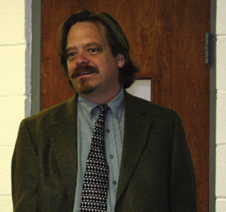College News
Photographer stresses storytelling in atypical profession
Notice: This article is older than 12 months. Names, contact information, programs, titles, etc. might have changed. If you have any problems please call the main college number, 1-800-682-8353, and we will be happy to direct you accordingly.

click image to enlarge ⊗
WRAL-TV chief photographer Richard Adkins speaks to broadcast production technology students at ... (more)
12.08.2004 • Curriculum Programs
Sanford, NC--Video and radio production students at Central Carolina Community College (CCCC) received some tips, stories and broadcasting insight Wednesday, December 8, 2004. Richard Adkins, chief photographer at WRAL-TV, spoke to three broadcast production technology classes about a typical day in the television industry.
" There are no typical days," Adkins said.
That is easy to believe after hearing some of the stories the 20-year industry vet shared about his experiences. Adkins has covered a murder trial and a mead-maker in the same day. His job has taken him from the beaches of North Carolina to the mountains of Japan. Adkins said on days like those, it is great to be a television photographer. "It's like stealing money."
However, Adkins stressed to the students that, while the job can be rewarding, the most important part is telling a person's story. "We're storytellers," he said. "Anybody can pick up a camera, not everyone can tell a story.
" You can report the news all you want, but if you can introduce people to people it will be more memorable," Adkins explained. "Every story has a beginning, middle and end. But every story has to have a character. That's what it takes to tell a good television story. You have to give the viewer something to connect with."
Adkins urged students to be conversational in order to bring out the best in a character and a story. "Just sit people down and talk to them," he pleaded. "You need to eliminate the sound byte. Let people talk to you."
Adkins also spoke passionately about the ethics of covering a story. When asked about staging or re-creating events, Adkins adamantly spoke against it. "That's not true. That's not real," he told the class. "It's not ethical. It's not an option." Adkins said reporters and photographers can avoid such troublesome situations by being prepared and said that in an industry based on trust you can not afford to compromise. "If I tip-toe over the line of staging, how can you ever trust me again?"
CCCC television instructor Heather Burgiss said this was the third time this semester students have interacted with WRAL-TV employees. In October, television broadcast production students toured WRAL studios in Raleigh. And in November WRAL assistant news director Rick Gall spoke to the broadcast management class.
Burgiss said she hopes students learn a lot from people like Adkins. "I think it always helps when they can be around a professional in the industry," she said. "I hope they learn about how to do things right the next time they are covering a story. Hopefully they'll do something different than they would have before and think about things more ethically."
For more information on the broadcast production technologies program at CCCC visit https://www.cccc.edu/Programs/Broadcast.html. You can also contact media technologies department chair Bill Freeman at bfreeman@cccc.edu.
Categories
- Admin, Faculty & Staff Category
- Arts & Entertainment Category
- Clubs Category
- College & Community Category
- College General Category
- Continuing Education Category
- Curriculum Programs Category
- Distance Education Programs Category
- Facilities/Buildings Category
- Finances Category
- Foundation Category
- Graduations Category
- Lee Early College Category
- NCCCS Category
- SGA Category
- Special Events Category
- Sports Category
- Students/Graduates Category
- Uncategorized Category
Archives

